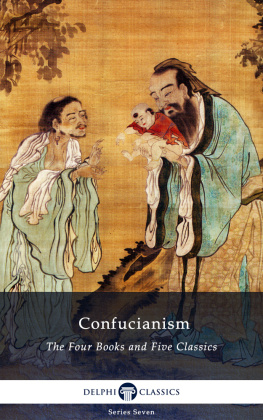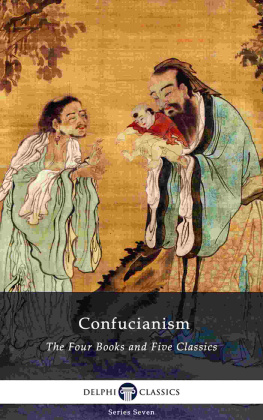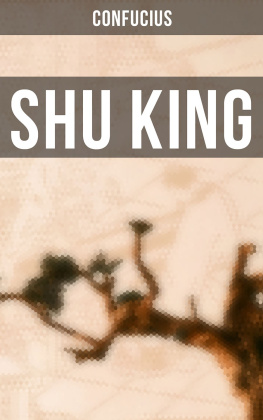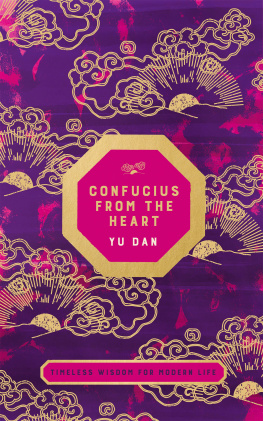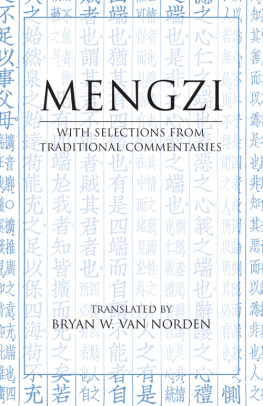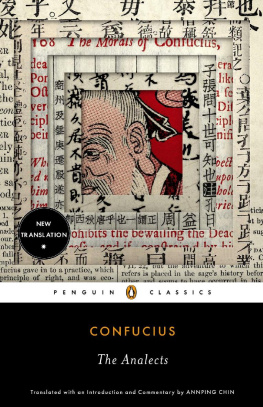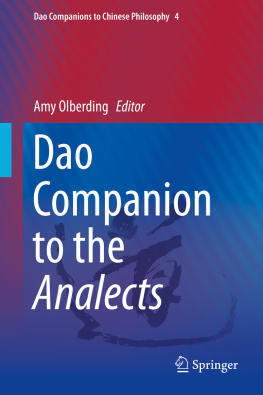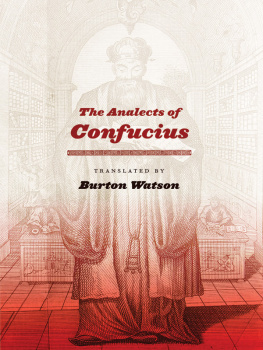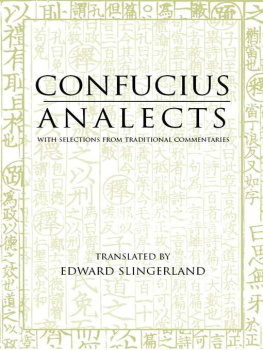CONFUCIUS
THE ESSENTIAL
ANALECTS
SELECTED PASSAGES WITH
TRADITIONAL COMMENTARY
CONFUCIUS
THE ESSENTIAL
ANALECTS
SELECTED PASSAGES WITH
TRADITIONAL COMMENTARY
Translated By
EDWARD SLINGERLAND
CONTENTS
vii
x
xii
xxiii
Analects, selected passages
PREFACE
The Analects is not a "book" in the sense that most modern Westerners usually understand a book-that is, a coherent argument or story presented by a single author, to be digested alone in the quiet of one's study. It is instead a record-somewhat haphazardly collected and edited together at an unknown point in history- of a dynamic process of teaching, and most likely was only committed to writing many years after the primary touchstone of the process, the Master Confucius, had passed away. It probably represents an attempt by later students and followers to keep alive the memory of his teaching, which had been conveyed both verbally and by personal example. Many, if not most, of the passages are quite cryptic, and this is possibly at least partially intentional. In 7.8, the Master is reported as saying, "I will not open the door for a mind that is not already striving to understand, nor will I provide words to a tongue that is not already struggling to speak. If I hold tip one corner of a problem, and the student cannot come back to me with the other three, I will not attempt to instruct him again." As we see throughout the text, Confucius' comments are often intended to elicit responses from his disciples, which are then corrected or commented upon by the Master. Therefore, these "ordered sayings" of Confucius were originally embedded in a conversational context within which their meaning could be gradually extracted.
By the late fourth century B.C.E., with the Master gone, direct conversation was no longer possible, but this merely forced the dialogue to take a different form. It is at this point that we get the beginning of what came to be an over-two-thousand-year-old tradition of commentary on the words of Confucius, which begins with such Warring States texts as the Mencius, Xunzi, and the Record of Ritual, and continues tip to the present day-carried on for most of this time in classical Chinese, branching out into the various vernaculars of East Asian nations in the Chinese cultural sphere, and finally expanding in the eighteenth century into a wide variety of Indo-European languages. This commentarial tradition for the most part represents an attempt by later followers or admirers of the Master to find "the other three corners," now no longer in dialogue with the Master himself, but rather by embracing extant clues about the Master's possible intention, the views of previous students of the text, and the opinions of contemporaries. For later students of the Analects, this written commentarial tradition serves as a proxy for the original conversational environment, providing context, making connections, and teasing out implications.
Since at least the Han Dynasty (202 B.C.E.-220), no Chinese student of the text has attempted to approach the Analects outside of the context of this written commentarial tradition. Most modern Chinese people, of course, read the text-originally written in classical Chinese, a purely literary language-with a translation into modern Chinese as well as extensive commentaries, but even traditionally educated Chinese conversant with the classical language find it necessary to base their understanding of the text upon the foundation of earlier commentaries. Indeed, the text of the Analects itself is arguably so concise as to be incomprehensible without some sort of interpretative apparatus imposed upon it. As John Makeham has noted, "Unless a reader is provided with a commentarial `context' in which flesh is added to the very spare bones of the text, [the Analects] frequently reads as a cryptic mixture of parochial injunctions and snatches of dry conversation. It is the commentaries which bring the text to life and lend it definition" (1997: 261). I have therefore always found it astounding that Western readers of the Analects have, for the most part, been left to their own devices in understanding this exceedingly difficult text, being presented with simply the bare, original passages with usually no more than a translator's introduction and occasional textual notes to rely on. Small wonder that so many have come away from the Analects with their impression of cryptic, mysterious Eastern "fortune cookie" wisdom reinforced. This, however, is not how the text is read in China, and is not at all how the text itself was originally meant. The passages that make up our received Analects were probably originally intended to be recited aloud, with teachers and students together discussing their meaning and subtleties. The commentarial tradition that has accreted around the text merely represents a written substitute for this original verbal interaction.
In the full version of this translation, published by Hackett in 2003 (Confucius: Analects), I attempted to give the English-language reader a hint of the richness of this context, a glimpse of the living text in its natural habitat, by presenting it with extensive running commentary. The present, shorter version that you are holding is a response to requests from some educators for a more compact edition suitable for a large world religion, philosophy, or history course, where the Analects represents merely one of many assigned readings. Rather than responding to this need by simply eliminating the commentary-ripping the text out of its native habitat once again-I have decided to provide selec tions from the Analects rather than the text as a whole. It is far preferable, in my mind, for students new to the thought of Confucius to acquire a full understanding of a representative selection of passages than to superficially skim over the text in its entirety. Because of the composite nature of the Analects -cobbled together by perhaps several generations of editors over an indeterminate span of time-there is a fair amount of repetition in the text, which makes it possible to significantly abridge it without omitting any major themes. Another variation in this edition is the separation of primary text and commentary into discrete sections, in order to provide a cleaner, less intimidating copy. This layout also allows students a chance to mull over the primary text on their own before turning to the explanatory comments, giving them their own chance to provide the "other three corners" to complete the square being hinted at by Confucius.
This solution to the problem of providing a more concise edition of the Analects without watering down its content was initially suggested to me by Lee Yearley over a very nice meal and bottle of Chianti, one of the many helpful nudges and excellent dinners he has bestowed on me over the years. This slim version of my translation of course owes all of the same debts as the full version; I'd just like here to mention again the particular contributions of Deborah Wilkes and Joel Sahleen. Deborah, my editor at Hackett, has been a source of constant encouragement and lucid advice, managing to skillfully balance our desire for academic integrity with the demands of common sense. Sensitive to the sometimes rather finicky needs of the author and yet thoroughly professional and efficient, Deborah has been a sheer pleasure to work with, and one could not hope for a better editor. My longtime friend and colleague Joel Sahleen generously agreed-despite the demands of new fatherhood and dissertation writing-to watch my sinological back, commenting extensively on the first draft of the fall translation and saving me from innumerable embarrassing gaffs and stylistic crimes. As a result of Joel's consistent firm guidance-urging me toward clarity of expression, grammatical responsibility, and historical accuracy-his voice permeates this entire translation. In keeping with Confucius' dictum on friendship, Joel would remonstrate with me gently, desisting when I was too stubborn to listen (12.23), and so was unable to save me from all of the sinological and stylistic errors no doubt still to be found in this translation. For these, of course, I take full responsibility.


